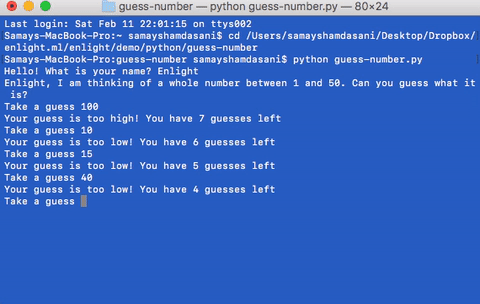Interested in this project?
Continue LearningGetting Started
Today we'll be creating a guessing number game in Python that you can run in your terminal. Open up your favorite text editor and let's begin!
To start, we'll need to import random as the random module will let us generate a random number for the user to guess.
Then, we'll set three variables:
numberofGuesses: set to 0 - contains how many guesses the user takesnumber: to generate the random numbername: set toraw_inputto get user's name
The number variable will be set to random.randint(1,50). This assigns the variable to a random integer between 1 and 50. You may change the range
if you wish.
Here's what our code should look like so far:
import random
numberofGuesses = 0
number = random.randint(1,50)
name = raw_input("Hello! What is your name? ")
Creating the while & if loops
Now, let's print a message to the user asking to guess a number between 1 and 50. After that, we can run more raw_inputs as guesses and calculate whether the guess was too high or low in a while loop with if statements.
Our while loop will run the functions in it until a certain number of guesses. In this case the while loop will be set to while numberofGuesses < 8:.
In the while loop, we can do the following:
- set a
guessvariable toraw_inputfor the guess- turn the
guessinput into an integer
- turn the
- for every guess, add (
1) to the variable ofnumberofGuesses - set a
guessesLeftvariable to 8 -numberofGuesses - use
ifstatements to see if guess is larger or smaller than number- convert
guessesLeftto a string and print out if number is to low/high
- convert
- set an if for
guess===number, which breaks the loop if true and prints out that you guessed the number innumberofGuessestries - set an if for
guess!=number(not equal), which prints out thenumberthat the computer generated as the user did not guess it within 8 tries
That may seem like a lot - and it is!
import random
numberofGuesses = 0
number = random.randint(1,50)
name = raw_input("Hello! What is your name? ")
print(name + ", I am thinking of a whole number between 1 and 50. Can you guess what it is?")
while numberofGuesses < 8:
guess = raw_input("Take a guess ")
guess = int(guess)
numberofGuesses = numberofGuesses + 1;
guessesLeft = 8 - numberofGuesses;
if guess < number:
guessesLeft=str(guessesLeft)
print("Your guess is too low! You have " + guessesLeft + " guesses left")
if guess > number:
guessesLeft=str(guessesLeft)
print("Your guess is too high! You have " + guessesLeft + " guesses left")
if guess==number:
break
if guess==number:
numberofGuesses=str(numberofGuesses)
print("Good job! You guessed the number in " + numberofGuesses + " tries :)")
if guess!=number:
number=str(number)
print("Sorry. The number I was thinking of was " + number + " :)")
Take note that when we want to either use the number in code our print it out, we need to convert it. First, we convert it to an integer (int(guess)). In the same way, when we want to print out a number, we make sure it is converted to a string (str(number)).

Comments (0)